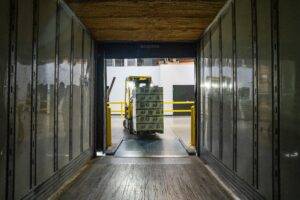Transportation is essential to the operation of the logistics system. Even though it is quite unusual to see trains and trucks moving goods or parked next to a commercial establishment, very few people understand how essential it is for the economy to have transportation that is both economical and trustworthy. Few people are aware of the significance that transportation plays in both the economy and the level of competition among firms. The procedure of logistics is the method that connects a company’s consumers and suppliers in a physical network. This procedure has a substantial influence on the degree to which customers are satisfied.
The process of logistics comprises not only planning and carrying out these operations but also transporting inputs and raw materials as well as finished items as part of this process. In addition to this, it takes into account the mode of transportation that was used to get there. The company must perform this activity with advanced planning to obtain greater efficiency, agility, and economy. These advantages are beneficial not just to the business but also to the customer.
This article is for you if you are interested in learning more about the logistics process and how it can help you move products more efficiently and if you are interested in learning how it may help you move items more efficiently.
What is Transportation in Logistics?
Transportation is a big business all over the world. What we mean by this is the transfer of finished goods and raw materials from one location to another. The supply chain is the initial stage in bringing a product to the client. The logistics of every operation depend heavily on the efficiency of its transportation links. It combines what were previously thought of as independent parts.
In order for transportation and logistics to work together smoothly, transportation systems must be effectively managed and monitored to facilitate communication between various parts of the supply chain. All links in the chain will have full transparency and solid lines of communication as a result. A supply chain’s efficiency can be evaluated by the care with which it handles transportation.
The Importance of Transportation in Logistics
Transportation, as was shown in the preceding section, is a crucial component of the logistical process. It’s vital to remember that conveyance is just one part of this process, but it’s a crucial one. Without some form of transportation, the logistical process breaks down. But there can’t be organized travel if no plans are made in advance. Thus, the interdependence of the stages ensures optimal performance across the board.
Transportation’s Effects on Logistics
The following are some of how transportation influences logistics:
- Warehouses, suppliers, retail sites, and clients or consumers all have an impact on the costs associated with transportation for a company.
- The quantity of inventory that must be kept on hand is influenced by the mode of transportation: transportation systems that are either very fast or very expensive may require a lesser quantity of inventory, whereas transportation systems that are either very slow or very inexpensive may demand a higher quantity of inventory.
- The decision between a slow or fast mode of transportation might affect not only the delivery schedule but also the packaging of the freight.
- Both the regulations for carrier categorization and the modalities of transport can affect the packing.
- The operation of various types of transportation could be altered depending on the outcome of contract discussions.
Transportation Methods That Vary
There are many distinct kinds of transportation available. The following describes the function of each type of transportation about logistics:Roadways
1. Roadways
Extremely adaptable, with the capability of providing door-to-door service. Roadway transport helps deliver goods to destinations that are located in remote areas and are a significant distance from ports, stations, or loading terminals.
2. Railways
Contributing significantly to the field of transportation When opposed to the delivery of products via roadways, rail transport is capable of delivering enormous volumes of commodities stably and cost-effectively.
3. Air Transport
It is generally suggested for high-value shipments to ensure quality, therefore this presents a distinct advantage. The rapid delivery speed has helped to reduce the risks that are associated with transportation, which has led to an improvement in the overall quality of logistics services as well as a reduction in the costs that are associated with the loss of items along the supply chain.
4. Water Transport
Due to the many benefits that come with using this mode of transportation, it is by far the most prevalent method of transportation employed in the logistics industry. Some of these benefits include a high capacity and cheap overall transportation costs. The majority of international commerce is conducted by water transport.
Transportation Strategies in Logistics
The ability to transport raw materials and finished products is fundamental to industrial production. In business, logistics is all about finding ways to cut costs without sacrificing quality of service. Transportation can be a leading competitive strategy for a company if it is well-planned.
The two most crucial factors to optimize are transportation expenses and speed of response to customers’ needs. It is possible that businesses will need to meet the following requirements in order to make sound transportation selections that will help them reach their objectives:
- Coordinate transportation plans with business plans.
- Keep a proper balance between internal and contracted transportation to accomplish company objectives.
- Integrate well with the world of online shopping.
- Save money on transportation and make transportation networks more responsive by using data analysis and visualization tools.
How Does Logistics Help Shipping?
Now that you have a basic understanding of logistics, you may examine the ways in which it improves cargo shipment.
1. Optimal Use of Time
The logistical process includes all the procedures required to carry out the effective receiving and distribution of products and raw materials, and it relates to the planning and implementation of these activities. Time optimization is achieved when preparation precedes execution, which is how the logistical process is expected to be carried out. This is due to the fact that increased mobility in transportation is possible with careful contingency planning.
Following are some of the most pressing current concerns:
- The times and dates that products and materials were received
- Keeping track of stock
- Means of transportable
- Fastest and most cost-effective way to get an item where it needs to go
- Contingency preparation.
2. Reduction of Costs
In addition to reducing the time it takes to complete deliveries, the logistics process also helps businesses save money. To start, optimizing your schedule can save you money on fuel all by itself. This is the first benefit. In addition, decisions are made in a manner that puts the least amount of burden on the organization due to meticulous financial planning that emphasizes making the most of available resources. This is accomplished by putting these factors in the order of priority. However, throughout all of these phases, there must always be an emphasis placed on providing high-quality service because this is what will ensure repeat business from clients.
3. Reduces Product Damage
The final step of the logistics process involves ensuring that the items are not damaged in any way while they are transported. This is because the route’s conditions are considered, as well as which mode of transportation can complete it most securely.
Wrapping Up
The logistics procedure is a time-consuming and intricate task. Having a reliable partner company is one method to guarantee high-quality delivery services, especially when businesses increasingly need to concentrate on their core competencies. I-Way Transport is involved in several stages of the supply chain.
- Product transfer between factories and warehouses.
- Matched procedures involving many customers’ goods transfers.
- Internal truck loading/unloading.
- And more…




